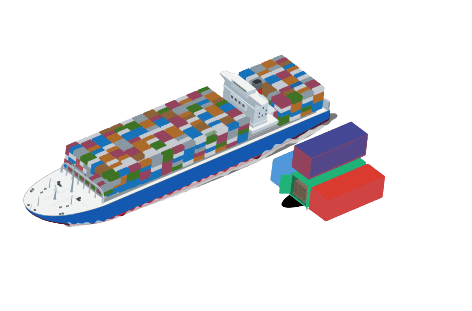If you work in foreign trade, you surely understand the importance of correctly issuing the AWB (Airway Bill) because any error in this document can cause enormous disruptions. AWB is an abbreviation of the term “Airway Bill,” which translates to “Modelo de Conhecimento de Embarque Aéreo” in Portuguese.
In this article, we will explore the relevance of this documentation in foreign trade, understand how it is structured, and learn about the types of AWBs, including the evolution to e-AWB.
What Is the Function of AWB in Foreign Trade?
The primary purpose of AWB is to indicate ownership of goods during import and export processes through international air transportation. It is the contract for the carriage of goods between the airline and the cargo owner, typically the freight forwarder responsible for shipping or receiving the goods.
AWB plays a crucial role in foreign trade logistics as it proves the airline’s responsibility to deliver the goods from the airport of origin to the final destination. Furthermore, it is an essential document for customs clearance and is mandatory for both export and import operations.
Required AWB Data
AWB follows an international standard for both domestic and international flights. To issue it, the following data is required:
- Company name of the issuing company.
- Document order number.
- Complete data of the exporter and importer.
- CNPJ (Corporate Taxpayer Registry) of the consignee.
- Airports of origin, destination, and transit.
- Number of packages.
- Packaging type.
- Gross weight of the cargo.
- Dimensions and cubic volume of the packages.
- Value and form of international freight payment.
- Description of the goods.
- Date of issuance.
- Signature of the issuer.
How Is AWB Numbering Structured?
The AWB number consists of 11 digits, divided into three parts. The first three digits represent the airline’s prefix, as defined by the International Air Transport Association (IATA). The next seven digits are the AWB serial number. Finally, the last digit is the verification digit, ranging from 0 to 6.
Types of AWB
There are three main types of AWB in foreign trade:
- AWB: It is the airfreight transport document used to cover individually shipped cargo on the aircraft. This type of AWB is issued directly by the airline.
- MAWB (Master Air Waybill): This is the air waybill issued by the airline for consolidated and/or direct shipments. It represents the total cargo received and/or sent by the forwarder and delivered to the airline for shipment.
- HAWB (House Air Waybill): It is issued by the freight forwarder and refers to either consolidated or non-consolidated cargo.
- e-AWB: The Evolution of AWB
The e-AWB is the electronic air waybill, which aims to eliminate the use of paper in air cargo transportation and replace it with digital data exchange. IATA announced e-AWB as a standard from January 1, 2019, making it the transportation contract for all air cargo shipments on enabled commercial routes.
Benefits of the New e-AWB Format
The adoption of e-AWB brings several benefits to foreign trade and air transport logistics, including:
- Reduction in administrative burden by eliminating the need for paper printing.
- Improved process productivity.
- Reduced data delivery time and operational costs.
- Enhanced customer service quality.
- Greater accuracy, confidentiality, and efficiency as e-AWB provides more precise data.
- Environmental contribution by reducing CO2 emissions related to paper use.
Conclusion
AWB, or the Air Waybill Model, is a fundamental document for foreign trade and airfreight transportation. It ensures ownership of goods, proves the airline’s responsibility, and is essential for customs clearance. With the evolution to e-AWB, air transport becomes more agile, efficient, and sustainable, representing a significant improvement in international logistics. Therefore, it is essential for foreign trade professionals to be familiar with AWB and its updates to ensure the success of import and export operations.
What is Cheap2Ship?
Get to know Cheap2Ship, a technology company specialized in logistics and foreign trade. Through our advanced freight management and quoting platform, medium and large companies have experienced a significant increase in operational efficiency and a reduction in logistics costs.
Our commitment is to provide greater transparency in the costs related to current freight providers, such as shipowners, freight forwarders, and carriers. With this, our customers can make more informed and strategic decisions for their businesses.
To learn more about our innovative solutions, visit our website and follow us on social media. There, you will find relevant content about foreign trade, logistics, and supply chain. We are ready to drive your company’s success in the global market. Join us and discover how we can make a difference for your business.

